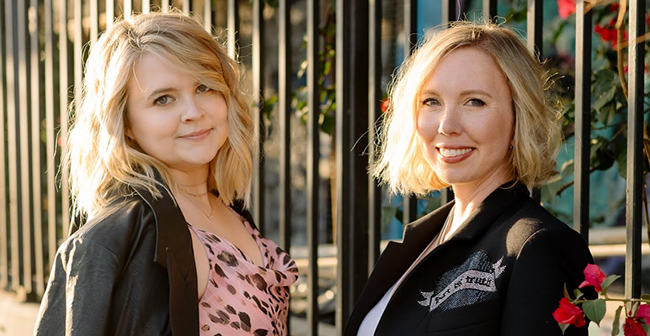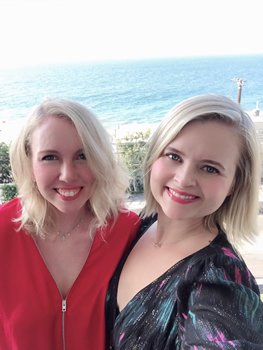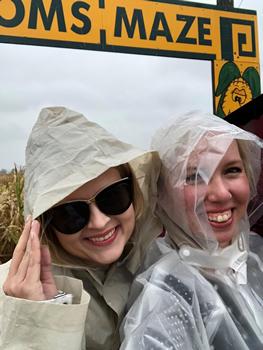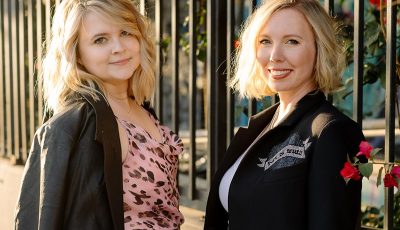

Up Close: Victoria Fulton and Faith McClaren
Blair Witch for the TikTok Generation
 By Dawn Ius
By Dawn Ius
Victoria Fulton and Faith McClaren had barely been friends for long, let alone co-writers, when the two landed a book deal together. They had no manuscript, no outline, scarcely an idea. If that feels like an author’s dream come true, you’re not wrong.
“We are living the dream,” they say. “It that why it still feels like a dream?”
It all started when the two saw a tweet from editor Wendy Loggia about a type of book she was looking for. The aspiring writer duo got on the phone first with their agent, then spent three hours in McClaren’s backyard playing idea football until they came up with a touchdown-winning premise—the story of four teen ghost hunters who spend the night in a famously haunted hotel.
They shook hands on the concept—and got to work.
For the next four days, Fulton and McClaren hashed out an 11-page proposal and 42 pages of a book. They sent it to their agent, who sent it to Wendy, who passed it on to their now editor Alison Romig.
“This is a crazy story,” Romig told them over the phone a week later. And then she made them an offer.
“We chalk it up to this,” the writers say. “When you listen to your heart and intuition over playing by the rules and sticking to the dreaded ‘shoulds,’ doors are more likely to open in faster and unexpected ways. Go with your gut and be open to all the possibilities.”
Sound advice. In this interview with The Big Thrill, Fulton and McClaren share the story of how they met, the inspiration behind HORROR HOTEL, and how they felt first seeing their debut novel’s stunning cover.
I love that the two of you met in an online writing class. I’d love to hear more about how that chance meeting transitioned into a writing partnership, and how you manage that collaboration when it comes to putting words on the page.
Time for a friendship origin story! (Cue the knuckle-cracking.)
We met in an online class for aspiring young adult and middle grade authors where we had to read and give feedback on each other’s work. Right away, we recognized the drive and potential in each other. Neither of us shied away from the other’s challenging feedback, and that made us fast online friends.
We started out following each other on Twitter and moved to email, then Facebook Messenger—where we were always bouncing ideas back and forth, talking about our goals and dreams for our stories—and our lives. We’re both screenwriters who write novels, and we gravitate toward commercial storytelling, which means our story sensibilities have always felt aligned.
We wrote our first (terrible) screenplay together, and then both got fed up with creating in a vacuum and started posting chapters of a novel on Wattpad. That book took off on the platform and led to all kinds of interesting things (some of which we can’t talk about yet), including landing our stellar agent Katie Shea-Boutillier.
Above all, we both think outside the box, are willing to take risks, and follow our hearts (and not the “rules”).
As far as how we collaborate to get words on the page, here’s a little snapshot from each of us:
Victoria Fulton: Words pour out of Faith like a faucet. I have no idea how she does it. I feel like I stare at the screen for hours, and then write and rewrite the same sentence 50 times before I get it right. That’s an exaggeration, but she is so fast, and can write difficult, emotionally complex scenes for hours and hours without looking up. I will never stop being envious of whatever muse blessed her with this ability to produce like the Energizer Bunny.
Faith McClaren: Victoria is an idea machine, but she’s willing to push ideas until they become the best they can possibly be. Even when I’m working on a solo project, I find myself asking questions like she does rather than just following the knee-jerk storytelling direction. I also find myself asking her questions to see what she thinks because I trust her instincts and love her input. She’s really funny and can always find the humor in a moment that would otherwise be super heavy. And I am endlessly grateful for how detail-oriented she is when it comes to massaging the words until they’re just right.
The tagline for HORROR HOTEL is pitch perfect—The Blair Witch Project for the TikTok generation. I know that the novel was also heavily inspired by the Netflix documentary Crime Scene: The Vanishing at the Cecil Hotel. What about that documentary was the most compelling and perhaps inspiring?
VF: The year Elisa Lam disappeared is the year I moved to LA—in 2013. I remember stumbling across the elevator video online and watching it over and over. What was she seeing? Who or what was she interacting with? Even if it was an invention of her own mind (she suffered from bipolar disorder), I couldn’t stop thinking about her and what those last moments must have been like for her. I also love her poignant tumblr posts, especially this heart-wrenching line, which we reference in the dedication:
“I suppose that is the human condition: to feel so big, so important but just a flicker in the universe and the struggle to come to terms with those two truths.”

McClaren and Fulton snap a selfie during a writing retreat at a boho-chic boutique hotel in Los Angeles.
I cry every time.
FM: I’ve always been drawn to haunted locations, especially ones I can visit in real life. The first time I ever stayed in Downtown LA, I was a few blocks away from the Cecil in another famously spooky hotel—the Millennium Biltmore. The whole idea of a location being a hotbed for dark spiritual activity really intrigued me, and the fact that serial killer Rick Ramirez—the Nightstalker—made the Cecil his home for a time was particularly disturbing and fascinating.
We felt that a group of teenage ghost hunters that includes a psychic medium would definitely be stumbling over themselves to get to a place like the Cecil Hotel. Especially since, in HORROR HOTEL they also believe Eileen Warren—the girl who famously disappeared from our fictional Hearst Hotel—was also a psychic medium who saw the truth about the darkness lurking at the heart of the hotel—and died for it.
The story follows a YouTube-famous ghost gang as they tour this haunted LA hotel. I’d love to hear more about how you developed these characters. They’re all so fully realized—was there one that was easier to write? One that was stubborn in revealing his or her character?
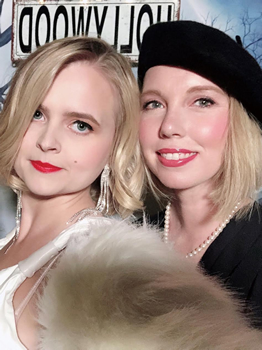
Fulton and McClaren at the Hollywood Forever Halloween party, dressed as Marilyn Monroe and Bonnie Parker
Creating characters that jump off the page is the best and most important part of the writing process. One of our favorite books is called Steal Like an Artist by Austin Kleon (inspired by the famous Picasso quote “Good artists copy; great artists steal”). We build characters that way, taking bits and pieces from everywhere—from people we know in real life, from other books, from TV shows and movies, and even (and maybe especially) from social media.
Chase is an all-business Capricorn, so he’s a bit of a control freak. Finding the balance between him being a leader to his friends as the mastermind of the YouTube channel and bossing them around because he thinks he knows best was a fun struggle. Kiki is the most emotionally transparent, but also the youngest and least emotionally astute about her own feelings. Her internal voice was the brightest, and we decided she’s a Libra (we love astrology), so she is always trying to help everyone get along. Emma has a duality that is very Gemini. Sharp sense of humor, brainy, but secretly soft inside, which directly affected her choices. And then there’s Chrissy, who—as the psychic and central character in the discovery of what is really going on at Hearst—was also the hardest to crack. She is guarded and stubborn—even with us.
Faith definitely related most to Chrissy, since we decided they’re both Scorpios, and what she’d show wasn’t always what she really felt. But writing a character you relate to isn’t necessarily easy. Victoria had the easiest time writing and developing Chase’s character because he’s just her business partner in teenage boy form. All the characters had their challenges, but Chrissy’s interactions with the other characters were probably the hardest to write because she’s so guarded and often hides what she is seeing and feeling from the rest of the Ghost Gang.
There’s some really great—and relatable—social media and pop culture references infused into this story. Why was that important for this book? Are there any dangers in including too much pop culture?
We think including things like TikTok and YouTube and grounding the voice with language teens use right now, populating the story with places they actually hang out, is important when writing YA. Books compete with every other form of entertainment for attention, so making this book feel relevant and present is a good way to engage our audience and help them feel understood.
Also, we both love YouTube and TikTok and all the social medias, so including those platforms in the book is an extension of who we are too.
HORROR HOTEL is fast-paced and certainly a commercial YA horror novel, but you do touch on some deeper themes. What would you like readers to take away from this, aside from an entertaining read?
There’s a lot of focus on friendship, both within the Ghost Gang and the excerpts from Eileen’s blog before she died. Feelings of isolation and being misunderstood by everyone around you are relatable no matter how old you are. The experiences at Hearst Hotel push the Gang to its breaking point, but we really wanted to show how much better it is when you work together to solve problems and resolve conflict instead of trying to go it alone.
The book reads very much like it was written by one person, which can be tough when you’re working with someone else. What, if any, are some of the challenges of writing together, and how do you overcome them?
The biggest challenge for us is that we are both strong-willed and highly intense, and that passion doesn’t just live on the page. Learning how to communicate as partners is different from just communicating as friends because there are higher stakes, but at the end of the day, we love and respect each other, and we are dedicated to getting and staying on the same page, both creatively and business-ly (it’s not a word, but it should be). The writing is easy because we have such a good foundation as friends.
HORROR HOTEL is really atmospheric—you did an excellent job of creating an eerie vibe without adding in gore for shock value. The Big Thrill is as much for aspiring writers as it is for readers. What are some tips you would offer for writers looking to create a classic eerie atmosphere?
In life, noticing the details that raise the little hairs on your arm, or make you pause and inhale an extra-long breath, is what you need to infuse your words with atmosphere. Pay attention to every sensation. Seek out the word for it. Find the image in your mind that it conjures. And then take your time to put that on the page.
Gore is cheap, and the reader’s imagination is a scarier place than anything we could describe in words, so leave a little room for the brain to go wild.
I’d be remiss if I didn’t gush a little about the cover. It’s stunning! Could you comment on how you felt when the cover was revealed?
We were on a writing retreat finishing the draft of HORROR HOTEL when the first cover concept hit our inbox, and we were absolutely blown away by David [Seidman]’s work. The way he captured the vibes of this unhinged little book is every author’s dream. The response to the cover has been overwhelming! We hit the jackpot, and we’re so glad (but not surprised) readers are as obsessed as we are.
The Ghost Gang feels primed for more adventures. Is this the beginning of a series? If yes, what can share about the follow-up, and if no, do you have another book in the works together?
Gasp! We would love that. We would love to say more, and we can’t. *winks*
- On the Cover: Alisa Lynn Valdés - March 31, 2023
- On the Cover: Melissa Cassera - March 31, 2023
- Behind the Scenes: From Book to Netflix - March 31, 2023

